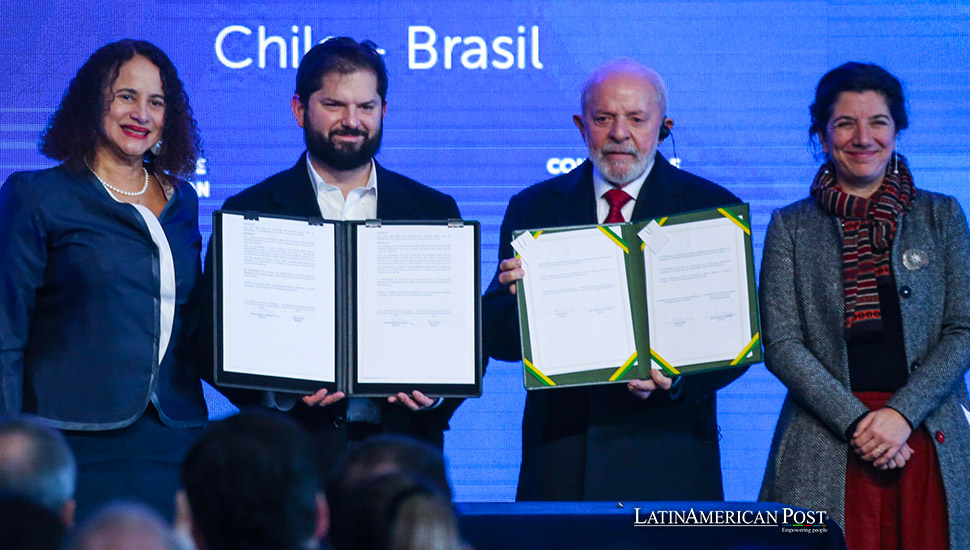Chile and Brazil Unite for Space Cooperation and Equality

Presidents Gabriel Boric of Chile and Luiz Inácio Lula da Silva of Brazil signed a memorandum in Santiago to collaborate on space activities, emphasizing the need for equitable access to space technology and benefits.
Presidents Gabriel Boric of Chile and Luiz Inácio Lula da Silva of Brazil have taken a significant step towards promoting space cooperation between their nations. On a historic day in Santiago, the two leaders signed a memorandum of cooperation focused on activities in the space sector. They highlighted that space is an area where inequality between countries is particularly pronounced, underscoring the importance of collaborative efforts to bridge this gap.
The agreement will enable Chile and Brazil to exchange information on science, technology, and innovation in the space field. It also aims to promote joint research projects, leveraging the strengths of both nations to advance their capabilities in space exploration and technology.
In his remarks during the signing ceremony, President Boric emphasized the inclusive vision for space exploration. “Space is not just for the millionaires who can afford a trip to see the Earth from above or for some to develop businesses and get rich. Space must also be a place where we all can benefit. That is why this agreement from the southern part of the world is so important,” Boric stated passionately.
The treaty was signed at what will be the future National Space Center (CEN) of Chile. This ambitious project represents an investment of $19 million in infrastructure and $15 million in equipment, with its inauguration expected in the second half of 2025.
Located in the municipality of Cerrillos, on the outskirts of the Chilean capital, the CEN will be one of three satellite stations being constructed in Chile. The other two stations are situated in Antofagasta in the north and Punta Arenas in the south. These facilities will include a control center for operating Chilean satellites in orbit, a laboratory for developing space technology, and another laboratory for processing data obtained from space.
Strategic Importance of Space Infrastructure
President Lula da Silva highlighted the strategic importance of space for national development. “The space sector is more strategic than ever for the development of a nation. There is no activity that does not demand space infrastructure: communications, energy generation, navigation, and even combating climate change,” he remarked.
Lula da Silva’s visit to Chile, which included a two-day official stay, underscored the importance of cooperation between southern hemisphere nations in addressing the significant disparities in space capabilities. He emphasized that such partnerships could help reverse the “great inequality” that exists in the space sector.
In addition to the space cooperation memorandum, Lula and Boric signed 19 other agreements during the official visit, including an extradition treaty. These agreements cover a wide range of areas, reflecting the deepening bilateral relationship between Chile and Brazil.
Before participating in the signing ceremony, President Lula da Silva met with Santiago’s Mayor Irací Hassler, whose mother is Brazilian, and visited former President Ricardo Lagos at his home. Lagos, who served as Chile’s president from 2000 to 2006, recently retired from public life.
Future Prospects for Space Collaboration
The establishment of the National Space Center (CEN) in Chile marks a significant milestone in the country’s space ambitions. The center will play a crucial role in advancing Chile’s space capabilities, supporting the development and operation of satellites, and fostering innovation in space technology.
The collaboration between Chile and Brazil is expected to yield numerous benefits for both nations. By pooling their resources and expertise, they aim to enhance their technological capabilities and contribute to global space exploration efforts. This partnership also serves as a model for other countries in the region, demonstrating the power of collaboration in addressing shared challenges and achieving common goals.
One of the key motivations behind the agreement is to address the significant inequalities that exist in the space sector. Both Boric and Lula emphasized that space should not be the exclusive domain of wealthy nations or individuals. Instead, it should be accessible to all, providing opportunities for scientific discovery, technological advancement, and economic growth
By working together, Chile and Brazil hope to create a more inclusive space sector that benefits everyone. This includes not only developing new technologies and capabilities but also ensuring that the knowledge and benefits derived from space exploration are shared widely.
Leveraging Regional Strengths
Chile and Brazil bring complementary strengths to their partnership in space exploration. Chile’s geographic diversity, with its northern deserts, central valleys, and southern regions, provides unique opportunities for space research and satellite operations. Brazil, with its established space program and experience in satellite development, offers valuable expertise and resources.
Together, they plan to leverage these strengths to advance their space capabilities and contribute to the global space community. This includes developing new satellites, conducting joint research projects, and sharing data and insights to address regional and global challenges.
The signing of the memorandum of cooperation between Chile and Brazil represents a bold vision for the future of space exploration in the southern hemisphere. It reflects a commitment to collaboration, inclusivity, and innovation, aiming to create a more equitable and prosperous future for both nations.
Also read: Latin American Citizens Can Volunteer to Take Part in Pioneering Space Research
As they move forward with their plans, Boric and Lula have expressed optimism about the potential of their partnership. They believe that by working together, they can overcome the challenges and seize the opportunities presented by the space sector, benefiting not only their countries but the entire world.




